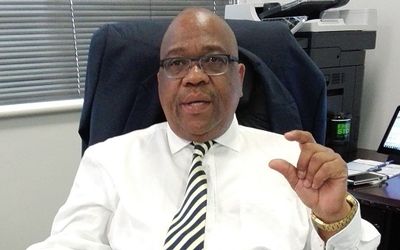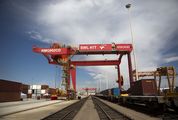KWAZULU-Natal’s devastating drought has a silver lining, says Cyril Gamede, CEO of Umgeni Water, the province’s largest supplier of potable water.
KwaZulu-Natal is one of five provinces that were declared drought disaster areas this summer.
"This drought is a blessing in disguise because we need to start taking hard and critical decisions on saving water and preserving it," Gamede says.
About half of the country’s water is unaccounted for — the so-called nonrevenue water.
"This means that some people are using water without paying for it. When you use water in this manner there is no incentive to save it."
From March this year all municipalities supplied by Umgeni Water have been forced to impose water restrictions. This affects the company’s bottom line as its revenues are derived only from selling water to municipalities.
Umgeni Water is the second-largest water board in SA after Rand Water. Wholly owned by the Department of Water and Sanitation, its primary responsibility is to build storage facilities, such as dams, pipelines, water works, and other water infrastructure. It has to source, purify, and store water and supply it to municipalities including eThekwini, uMsunduzi, uMgungundlovu, Ugu, and Ilembe.
Umgeni Water is not funded by the government but raises finances for its capital projects from its revenue and from local and international lending institutions.
Gamede believes SA needs to build dams across the country, and build technical staff capacity to prevent future effects of drought.
This will cost billions of rand, but will protect SA’s towns and cities from running out of water, as several did during the drought.
"It takes between five and seven years to build a dam," he says. "We need to plan ahead and build the necessary infrastructure so that the country’s growth will not be hampered by a shortage of water.
"If these dams are built in time we would be able to store more water, not only for the dry seasons, but also for the severe droughts."
The construction of Umgeni Water’s planned massive Upper Umkomaas Dam is being delayed by municipalities that are unwilling to contribute to the R17bn cost.
Gamede says the dam is necessary to secure water supply to Durban and Pietermaritzburg.
...
THE main problem, he says, is that many municipalities lack the expertise or capacity to provide water. "They don’t have enough engineers, technical staff, and even plumbers to deal with their day-to-day duties.
"For example, if there is a leak somewhere it takes days, weeks, months and, in some cases, even years, to fix it. If we are to conserve water, we need to change this state of affairs," Gamede says.
The lack of technical water skills also results in many municipalities failing to spend the funds allocated through the national government’s Municipal Water Infrastructure Grant. The funds are often returned to the Treasury, unused.
"Some municipalities come to us and we help them deliver on infrastructural projects and the funds are saved. Others push us away when we try to help. They would rather have the money return to the Treasury than to seek outside help," Gamede says.
"The whole of SA should have been covered by the wall-to-wall water boards. Currently, there are vast areas in the country that have no water boards, and municipalities do their own piecemeal projects to provide water to their constituencies. A water board is able to look at large areas, plan and cross-subsidise to build dams and other projects that would benefit larger communities."
On whether the desalination of seawater would save SA, he says the costly method is unaffordable to a country such as SA.
As CEO of Umgeni Water, the accounting buck stops with Gamede. He guides the board’s day-to-day activities, provides strategic leadership, is in charge of an annual budget of more than R2bn, and manages more than 1,000 staff, ranging from highly trained engineers to financial and technical managers, technicians, plumbers, and general labourers.
...
SINCE he took over in 2012, Umgeni Water has been expanding, delivering water infrastructure to communities across KwaZulu-Natal.
"I think the most important thing is that during my tenure we have spent a lot of money to build infrastructure and give access to water to people who did not have water in the past, especially in rural areas," he says.
Gamede holds several academic qualifications, including a Master’s in engineering and a Master’s in business administration.
He is the president of the Engineering Council of SA, a role he is using to drive transformation in the white-dominated engineering profession, by supporting black engineering students.
They don’t have enough engineers, technical staff, and even plumbers to deal with their day-to-day duties

Umgeni CEO Cyril Gamede says SA must build more dams to alleviate the effects of drought. Picture: NCE MKHIZE
KWAZULU-Natal’s devastating drought has a silver lining, says Cyril Gamede, CEO of Umgeni Water, the province’s largest supplier of potable water.
KwaZulu-Natal is one of five provinces that were declared drought disaster areas this summer.
"This drought is a blessing in disguise because we need to start taking hard and critical decisions on saving water and preserving it," Gamede says.
About half of the country’s water is unaccounted for — the so-called nonrevenue water.
"This means that some people are using water without paying for it. When you use water in this manner there is no incentive to save it."
From March this year all municipalities supplied by Umgeni Water have been forced to impose water restrictions. This affects the company’s bottom line as its revenues are derived only from selling water to municipalities.
Umgeni Water is the second-largest water board in SA after Rand Water. Wholly owned by the Department of Water and Sanitation, its primary responsibility is to build storage facilities, such as dams, pipelines, water works, and other water infrastructure. It has to source, purify, and store water and supply it to municipalities including eThekwini, uMsunduzi, uMgungundlovu, Ugu, and Ilembe.
Umgeni Water is not funded by the government but raises finances for its capital projects from its revenue and from local and international lending institutions.
Gamede believes SA needs to build dams across the country, and build technical staff capacity to prevent future effects of drought.
This will cost billions of rand, but will protect SA’s towns and cities from running out of water, as several did during the drought.
"It takes between five and seven years to build a dam," he says. "We need to plan ahead and build the necessary infrastructure so that the country’s growth will not be hampered by a shortage of water.
"If these dams are built in time we would be able to store more water, not only for the dry seasons, but also for the severe droughts."
The construction of Umgeni Water’s planned massive Upper Umkomaas Dam is being delayed by municipalities that are unwilling to contribute to the R17bn cost.
Gamede says the dam is necessary to secure water supply to Durban and Pietermaritzburg.
...
THE main problem, he says, is that many municipalities lack the expertise or capacity to provide water. "They don’t have enough engineers, technical staff, and even plumbers to deal with their day-to-day duties.
"For example, if there is a leak somewhere it takes days, weeks, months and, in some cases, even years, to fix it. If we are to conserve water, we need to change this state of affairs," Gamede says.
The lack of technical water skills also results in many municipalities failing to spend the funds allocated through the national government’s Municipal Water Infrastructure Grant. The funds are often returned to the Treasury, unused.
"Some municipalities come to us and we help them deliver on infrastructural projects and the funds are saved. Others push us away when we try to help. They would rather have the money return to the Treasury than to seek outside help," Gamede says.
"The whole of SA should have been covered by the wall-to-wall water boards. Currently, there are vast areas in the country that have no water boards, and municipalities do their own piecemeal projects to provide water to their constituencies. A water board is able to look at large areas, plan and cross-subsidise to build dams and other projects that would benefit larger communities."
On whether the desalination of seawater would save SA, he says the costly method is unaffordable to a country such as SA.
As CEO of Umgeni Water, the accounting buck stops with Gamede. He guides the board’s day-to-day activities, provides strategic leadership, is in charge of an annual budget of more than R2bn, and manages more than 1,000 staff, ranging from highly trained engineers to financial and technical managers, technicians, plumbers, and general labourers.
...
SINCE he took over in 2012, Umgeni Water has been expanding, delivering water infrastructure to communities across KwaZulu-Natal.
"I think the most important thing is that during my tenure we have spent a lot of money to build infrastructure and give access to water to people who did not have water in the past, especially in rural areas," he says.
Gamede holds several academic qualifications, including a Master’s in engineering and a Master’s in business administration.
He is the president of the Engineering Council of SA, a role he is using to drive transformation in the white-dominated engineering profession, by supporting black engineering students.
They don’t have enough engineers, technical staff, and even plumbers to deal with their day-to-day duties




















